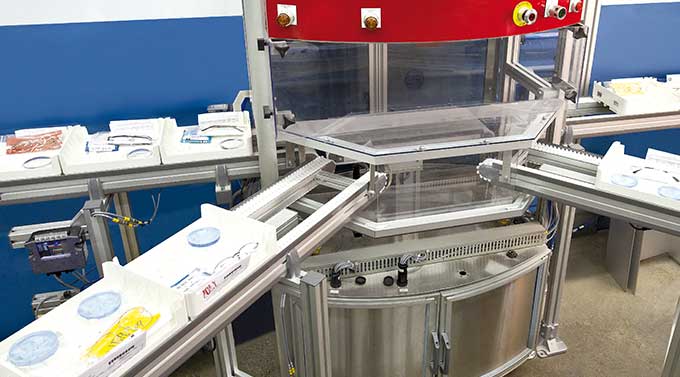
Today, automated production flows are often part of the overall economic plan for manufacturers. Automation is a way of adapting to a changing manufacturing environment and staying competitive on the market. In my previous article I described three advantages of automated production flows. Here follows a few more that I believe stand out in today’s industry.
1. Improving quality assurance and maintaining overall quality
 In automated production flows, the same standards and procedures are applied throughout the process, without variance. Automated equipment and robotics can manufacture and continually repeat consistent final product results. When a machine is programmed to perform a task over and over again, the accuracy and repeatability, compared to manual handling, is far greater. Through automation, the manufacturing processes can be carefully regulated and manipulated in order to maintain overall quality.
In automated production flows, the same standards and procedures are applied throughout the process, without variance. Automated equipment and robotics can manufacture and continually repeat consistent final product results. When a machine is programmed to perform a task over and over again, the accuracy and repeatability, compared to manual handling, is far greater. Through automation, the manufacturing processes can be carefully regulated and manipulated in order to maintain overall quality.
2. Quality inspection can be made on the fly
 Automation systems can easily incorporate automatic quality checks and verifications to reduce the number of parts produced out of tolerance. Automation also allows for statistical process controls, ensuring more consistent and uniform products. With integrated inspection devices for quality control, quality checks can be made on the fly, and defective units are automatically detected and rejected by the production line.
Automation systems can easily incorporate automatic quality checks and verifications to reduce the number of parts produced out of tolerance. Automation also allows for statistical process controls, ensuring more consistent and uniform products. With integrated inspection devices for quality control, quality checks can be made on the fly, and defective units are automatically detected and rejected by the production line.
3. Traceability can be made on the fly

Today, the ability to trace a product through its processing procedures and re-trace it back, is a long-term strategy for most manufacturers. With automated production flow solutions, traceability can be made on the fly. Implemented traceability programs give you access to track and trace functionality. You can manage all resources in the assembly process including operators, machines, and parts, as well as all the data required for production and quality assurance.
Automation should be part of the overall economic plan – true or false?
I have described a few advantages of production automation that I believe stand out in today’s industry. In the third and last part of my article series, I will focus on production environment and working conditions in automated factories, keep an eye out on the blog! Until then, I have a question for you: Do you think automation should be part of the overall business plan for manufacturers? If yes, what are the reasons? Let me know in the comments! I am interested in your thoughts.
If you have any questions or want to know more about industrial automation, don’t hesitate to contact me. Also visit FlexLink’s website for more information.




Yes I agree with this article. Today there is a high pressure on businesses to provide high quality and consistently better products at a competitive price. To address this challenge, businesses are approaching to industrial automation companies to design and develop products through robotic process automation.
Though the automotive industry is the largest user of industrial robots, robotics is no longer considered just a luxury in manufacturing. It can be a competitive advantage for all industries.
Yes I agree. Businesses now has to go towards economies of scale, i.e large scale production for better productivity at least rates to cope up with high end competition while keeping good quality of products.